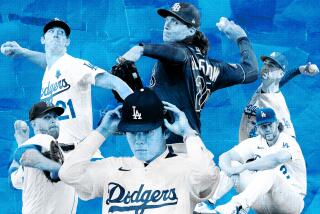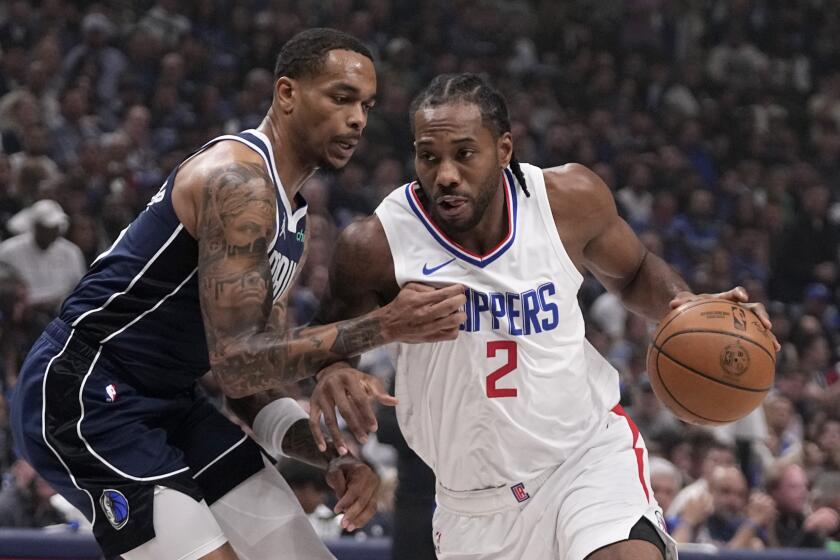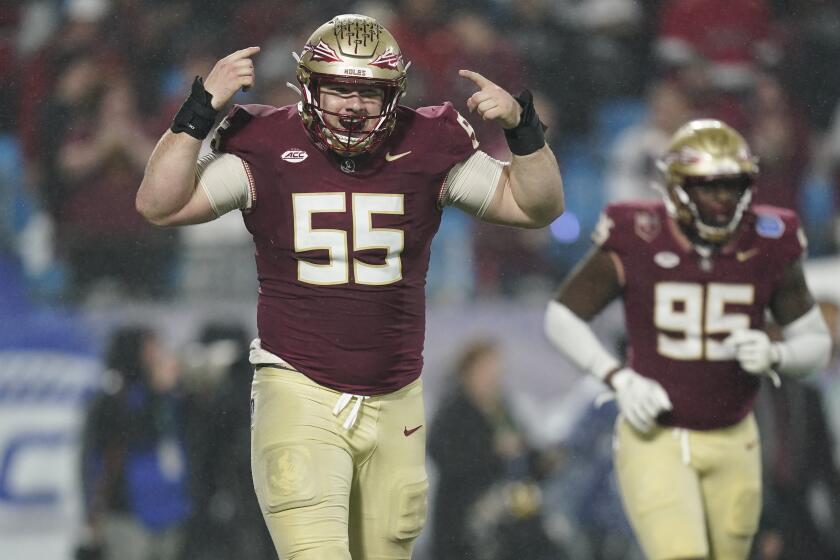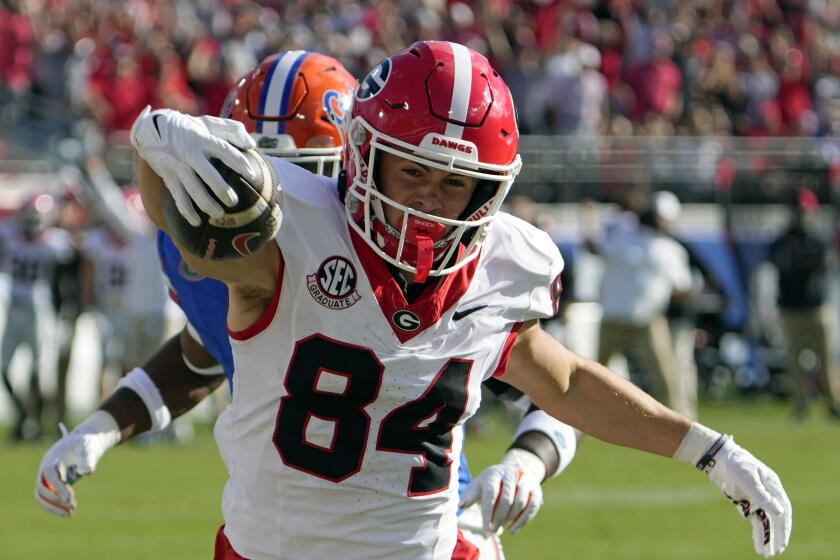Dodgers are about to become baseball’s new money
The judge who presided over the Dodgers’ bankruptcy case is a huge baseball fan. He invited an attorney to speak by saying “batter up,” referred to last Friday’s morning and evening court sessions as “a day-night doubleheader” and proudly shared his love for the Philadelphia Phillies.
And so it was that, when all the shouting was over Friday night, U.S. Bankruptcy Judge Kevin Gross held aloft the document he had to sign to approve the sale of the Dodgers.
“I was looking in the order for language that says they can’t sign Cole Hamels,” Gross said. “I couldn’t find it, but I may still insert it.”
Turns out that, without his robe and gavel, Gross is just another fan nervous at the prospect that the Dodgers are about to become baseball’s latest economic superpower.
Magic Johnson and Co. bought the Dodgers for $2 billion, with the team on the verge of a television deal worth $4 billion — or more. In that financial stratosphere, the Dodgers could lavish $20 million a year on Hamels next winter and call it petty cash.
Not that Judge Gross or his Phillies would deserve any sympathy, since his team already pays Roy Halladay, Cliff Lee and Ryan Howard that much money every year. But no one says the Dodgers could become a West Coast version of the Phillies.
Everyone puts it this way: The Dodgers could become a West Coast version of the New York Yankees.
You know, the Yankees, the team with a starting infield making $83 million this season — four guys here making more than the entire 25-man roster on 14 major league clubs.
“This team is built to win,” Yankees catcher Russell Martin said. “If there’s a piece missing, they’ll do anything they can to get that piece.”
Yet there is more to winning than spending money.
“Much more,” Martin said. “It is more about piecing the puzzle together than just buying players.”
The creative tension between Johnson and incoming Dodgers president Stan Kasten should be fascinating to watch. Johnson said he would have courted Albert Pujols if his group could have bought the Dodgers sooner; Kasten is a player development guy who has reminded friends he was no longer president of the Washington Nationals when that team handed $126 million to Jayson Werth.
There is work to be done with the Dodgers, lots of work to revitalize a minor league system virtually devoid of prospects among position players and an international scouting program starved of financial resources.
The suddenly wealthy Dodgers cannot exploit the draft or Latin America as they could have last year because of spending restrictions imposed in the new collective bargaining agreement.
However, the risk-reward scale for free agents is increasingly tilted toward risk, with teams in smaller markets retaining a growing number of franchise players rather than abandoning them to free agency.
Troy Tulowitzki could have been a free agent this fall, but the Colorado Rockies signed him. Ryan Braun could have been a free agent next fall, but the Milwaukee Brewers signed him. Matt Cain is staying with the San Francisco Giants, Alex Gordon with the Kansas City Royals, Joey Votto and Brandon Phillips with the Cincinnati Reds.
The road to a dynasty is not paved with cash alone. Take it from a star on the team with baseball’s fattest wallet.
“Magic knows,” Yankees center fielder Curtis Granderson said. “When the Lakers, Pistons and Bulls had a good run, they got a group of good young players together, and they kept them.
“You haven’t seen that a lot in baseball. I think that’s why you’ve had so many different winners.”
When the Yankees won the World Series four times in five years, Derek Jeter, Andy Pettitte and Jorge Posada were well shy of age 30. This, ultimately, is where Magic’s Dodgers have an advantage they would do well not to squander: two franchise players in 27-year-old outfielder Matt Kemp and 24-year-old pitcher Clayton Kershaw.
The Dodgers can build around them, rather than rebuild.
The Magic Era will dawn in a little more than two weeks. Millions could fall from the heavens, and into the wallets of players. The Dodgers could spend freely, and surely they would win.
At that, Granderson laughed. The baseball gods do not abide by conventional wisdom.
Granderson played for the Detroit Tigers in 2008, when the team spent money and prospects to acquire Miguel Cabrera and Dontrelle Willis.
“We got the pieces. We spent the money,” Granderson said. “We were going to score 1,000 runs.
“We finished fifth in the American League Central.”
Turns out you need money, and a little Magic too.
twitter.com/BillShaikin
More to Read
Get our high school sports newsletter
Prep Rally is devoted to the SoCal high school sports experience, bringing you scores, stories and a behind-the-scenes look at what makes prep sports so popular.
You may occasionally receive promotional content from the Los Angeles Times.







